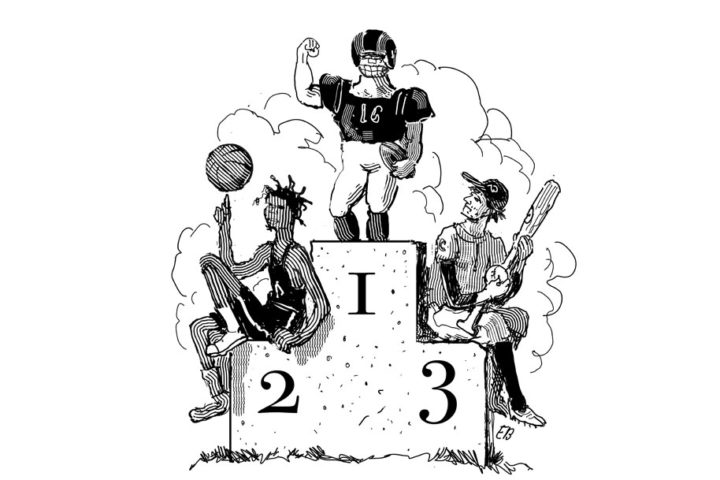A commonplace states that history rhymes rather than repeats. But as the length of a coastline will vary according to units of measurement, what history does will depend upon the breadth of the criteria by which it is judged. Expressed in miles, the coast from Maine to Florida is a tiny fraction of its length in the millimeters capable of tracking so much more of its every crinkle, bend, and cleft.
If apprehended widely, in Shakespeare’s “gross and scope,” history does indeed repeat itself. Though vegetarian madmen with brush mustaches will not invade most of Europe, we are watching now as destructive forces rise in familiar form and are shielded by the mystic blindness that allows succeeding generations to recapitulate the tragedies of their forbears.
After the twin shocks of the Great War and the influenza pandemic, revanchist dictatorships established themselves in Europe and Asia, just as today. Despite immense superiority in position, armaments, population, and material wealth, the democratic nations in despotism’s sights lost heart, courage, and, just as today, good sense. Time after time—in Ethiopia, China, the Rhineland, and Munich—the West lurched backward in gratuitous retreat, boasting that forbearance and surrender signified strength. As if on cue, we have done the same in the South China Sea, the Crimea, Ukraine, Afghanistan, submission to Iran, and retreat from the Middle East, the strategic nexus once justly recognized as essential to the stability of the three continents adjoining it.
China, Russia, and Iran pay rapt attention to the cultivation of their military powers. But the governments and peoples of the West have forgotten that the struggles between rising and dominant nations—in the main, at last call, and even if dependent upon their economic foundations—are decided by military strength. A skeptic might challenge this by citing, for example, the United States and Britain, but only if he ignores two wars and a century of naval competition.
Hopelessly beyond merely refusing to fight for king and country, we are materially obsessed, paralyzed by imagined privations and exaggerated grievances, and anaesthetized by snacks, drugs, and rock ‘n’ roll: i.e., addictions and entertainment. With lightning speed, what remains of the republic is dividing into countless racial, sexual, and ethnic Bantustans signifying nothing much more than the death of equality before the law. That this seems eerily familiar is because it is what civilization has spent centuries trying to escape.
As in the interwar years of the 20th century, spellbound national elites neither credit nor comprehend deterrence, balances of power, correlations of force, or the potentials of maneuver in the international system. To borrow from H.G. Wells’s dystopian novella The Time Machine, because we American Morlocks have since the Second World War guaranteed their freedom at home and ability to venture safely upon the sea, the European Eloi have been schooled to believe in the power of performative diplomacy, multilateralism as magic, and—no more strikingly than in the Iran agreements—the putrefaction of nuance that allows breathtakingly stupid officials to embrace enemies who with neither concealment nor subtlety declare their intent to conquer, ravish, and destroy them.
And while Europeans imagine that they are protected by the very making of agreements, thoughtless Americans believe even as the navy shrinks and rusts that we are protected by the oceans. The oceans failed to protect us decisively even centuries ago in the closely run Revolution and the War of 1812, when the tyranny of separation and distance were effectively that much greater. They certainly will not do so now.
* * *
It isn’t merely that we and our European allies kneel before aggressors and fail to make the preparations necessary to repel them. We have fallen into a kind of Stockholm Syndrome not only of taking sides against ourselves but, as in the 1930s, of aping the authoritarianism of our enemies. Authoritarian governments never fail to elevate chosen segments of their populations and suppress others. Having adopted and praised this practice, which we call equity, we are now like them.
And how far are we, really, from China’s Orwellian social credit system? Multiple GPS devices, cameras, and point-of-sale computers track us. Biometric and DNA tracing can either exclude us or pin us ineluctably to an event. Our presumptuous Google masters surveil us so they can, as they state openly and repeatedly, tell us what we want. And for those who fall into the trap, our social media magnify and preserve all the mistakes and idiocies that time once charitably allowed to fade away.
As if in the hypnotic sway of the authoritarians we soon would fight, prior to World War II we willfully and vigorously abandoned checks and balances, tried mightily to dissolve the separation of powers, limited individual liberty (a phrase that has never failed to nauseate the Left), tolerated the rise of domestic fascist and Communist movements, turned against republican principles, ignored the militant rise of Germany and Japan, put faith in spurious agreements, refused to read other gentlemen’s mail, and scattered across the land public buildings that in their continuing blight have conferred upon Benito Mussolini a truly unfortunate species of immortality.
Now we imitate and repeat: “saving” the economy by attacking the engines of prosperity, adopting a dictatorial industrial policy beyond mere dirigisme and closing upon democratic centralism, disarming with inverse proportionality to the speed with which our avowed enemies enlarge their arsenals, and proudly diminishing every strength and asset that shields us from the chaos and destruction abroad.
History repeats itself as we are paralyzed amid locked-in repetitions that, almost majestically, roll through all things—as they will, and as they shall, should we not wake from our narcotic sleep. Though the fire next time may be hotter and more destructive than any in living memory, and you can sound the tocsin day and night, people do not come forth in numbers sufficient to do the work that must be done.



